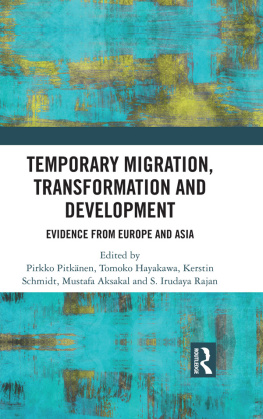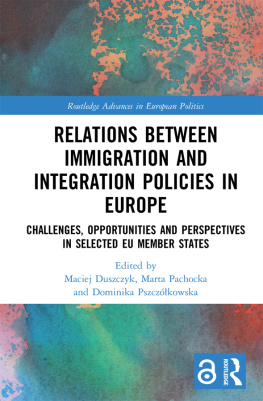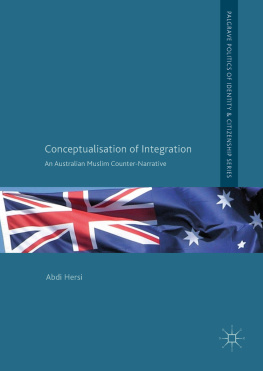MOVING UP AND GETTING ON
Migration, integration and social cohesion in the UK
Jill Rutter
First published in Great Britain in 2015 by
Policy Press University of Bristol 1-9 Old Park Hill Bristol BS2 8BB UK Tel +44 (0)117 954 5940 e-mail
North American office: Policy Press c/o The University of Chicago Press 1427 East 60th Street Chicago, IL 60637, USA t: +1 773 702 7700 f: +1 773-702-9756 e:
Policy Press 2015
British Library Cataloguing in Publication Data
A catalogue record for this book is available from the British Library.
Library of Congress Cataloging-in-Publication Data
A catalog record for this book has been requested.
ISBN 978-1-4473-1464-6 ePub
ISBN 978-1-4473-1465-3 Kindle
The right of Jill Rutter to be identified as author of this work has been asserted by her in accordance with the 1988 Copyright, Designs and Patents Act.
All rights reserved: no part of this publication may be reproduced, stored in a retrieval system, or transmitted in any form or by any means, electronic, mechanical, photocopying, recording, or otherwise without the prior permission of Policy Press.
The statements and opinions contained within this publication are solely those of the author and not of The University of Bristol or Policy Press. The University of Bristol and Policy Press disclaim responsibility for any injury to persons or property resulting from any material published in this publication.
Policy Press works to counter discrimination on grounds of gender, race, disability, age and sexuality.
Cover design by Policy Press
Front cover: image kindly supplied by Ed Gray
Readers Guide
This book has been optimised for PDA.
Tables may have been presented to accommodate this devices limitations.
Image presentation is limited by this devices limitations.
To M, with much love.
Contents
Figures
Tables
A.2 Population size and migration routes among main country-of-birth groups in UK, 2013
Material from the Labour Force Survey is Crown Copyright and has been made available by National Statistics through the Economic and Social Data Service and has been used with permission. Neither National Statistics nor the Economic and Social Data Service bears any responsibility for the analysis or interpretations of the data reported here.
Moving Up and Getting On uses the findings of a number of research projects that I have undertaken over the last ten years. Without funding for this work, I would not have been able to write this book, so I am grateful to the Migration Foundation, Trust for London and Unbound Philanthropy for their generosity.
I would like to thank Katherine Stocker, who helped me with the analysis of quantitative data, my reviewers and staff at Policy Press for their work in turning a manuscript into a book. I am grateful to Ed Gray for allowing me to use On Camberwell Green as a cover image. I saw this painting in a gallery shortly after undertaking some interviews. It seemed to encapsulate some of the themes of my book diverse groups of people mixing and somehow getting on with each other, barring a few minor irritations.
I would also like to thank past colleagues at the Institute for Public Policy Research: Danny Sriskandarajah, Rick Muir, Miranda Lewis, Laurence Cooley, Rachel Marangozov, Naomi Pollard, Laura Chappell, Tim Finch, Maria Latorre, Sarah Mulley and especially Matt Cavanagh for encouraging me to write this book. I am also grateful to many people for ideas and comment over the years, including Liz Collett, Helen Crowley, Tzeggai Yohannes Deres, Ben Gidley, Mary Hickman, Nick Mai, Barbara Harrell-Bond, Trevor Phillips, Khalid Koser, Will Somerville, Sarah Spencer, Roger Zetter and many former colleagues at the Refugee Council. My friends Barbara Roche and Georgie Wemyss also provided input and ideas. My good-humoured colleagues at the Family and Childcare Trust need to be thanked; I am very lucky in that I enjoy my day job and work with nice people. They are too numerous to mention, but I am particularly grateful to Duncan Lugton for his support over the last year. I would also like to thank all the NHS staff both Brits and migrants who kept me alive in 2009 and 2013. Without them I would not be here to write this book. Finally, my sons Emil and Izzy deserve thanks, simply for being Emil and Izzy.
| DCLG | Department for Communities and Local Government |
| EAL | English as an additional language |
| EEA | European Economic Area |
| ELAP | Early Legal Advice Pilot |
| ESOL | English for speakers of other languages |
| EU | European Union |
| NAM | New Asylum Model |
| NGO | non-governmental organisation |
| OEDC | Organisation for Economic Co-operation and Development |
Part One:
Setting the scene
The genesis of this book took place in the Royal Courts of Justice in the Strand, London. I was sitting in court hearing a request to release a young Iraqi Kurd from long-term immigration detention. I was not aware of the background to the case, but as it progressed I was informed that the appellant had a criminal record. He had served a sentence for a sexual assault on a teenage girl. At the time I felt unsympathetic towards this man. Later, I talked to his solicitor and learned more about his life. He had arrived in the UK as a 19-year-old asylum-seeker and been dispersed to live in Home Office-commissioned accommodation in a northern city. Regulations meant that he was not allowed to work or attend college to improve his English. Nor was there advice and assistance available to him from non-governmental organisations or members of his own community, as he had been sent to live in an area where there were few refugees. He had no close friends and, unlike in his home country, he could not turn to members of his own community to broker a relationship or marriage. There was no one to guide his behaviour and provide the informal counselling that most of us receive from friends and family. A friendly conversation with a British woman was misinterpreted by him and he ended up in prison with a recommendation of deportation at the end of his sentence.
Of course, the young man bears responsibility for his actions. But he was set up to fail by a system that prevented his economic and social integration. He could not work or study and had no social networks to guide him. At the time, migrant integration had slipped down the political agenda and I wanted to draw attention to this shortcoming of government. I wanted to try to prevent others from failing as seriously as the young Iraqi Kurd.
This man was a new migrant in the UK. Today the UN estimates that one person in 25 is a long-term resident outside the country of their birth and is thus defined as a migrant. This book is about two aspects of international migration how migrants integrate and their social relationships within the UK.
Although international migration has always been a feature of life in the UK, it has increased significantly since the early 1990s, caused by more asylum arrivals, sustained student and work-visa flows and large-scale migration from the European Union after 2004. By Census 2011 the overseas-born population of England and Wales came to 13.4%.






